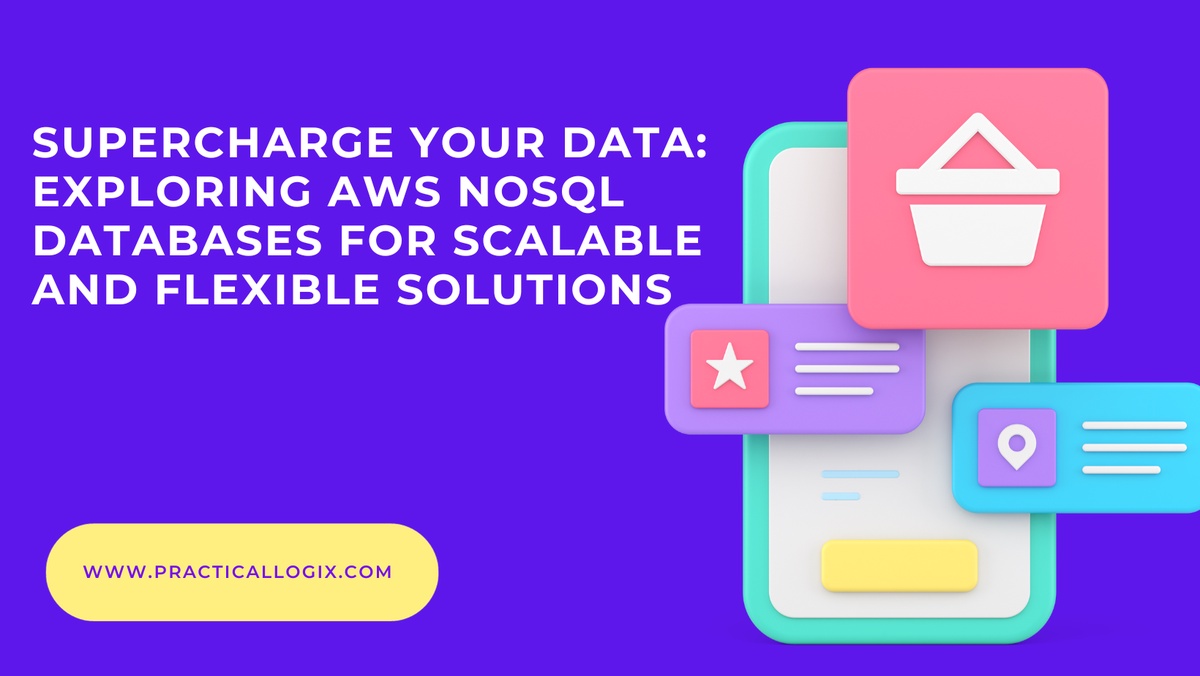In the present-day data-driven landscape, businesses are consistently seeking efficient and scalable approaches to manage and process substantial volumes of data. This is where AWS NoSQL databases play a pivotal role, offering a robust solution for handling unstructured or semi-structured data. In this blog post, we will delve into the realm of aws nosql db, exploring their capabilities and why they are the preferred choice for many organizations in search of scalable and flexible data solutions.
What Is AWS NoSQL?
NoSQL, an abbreviation for "Not Only SQL," refers to a category of databases designed to store and retrieve data that does not neatly fit into the traditional relational database model. These databases are well-suited for unstructured and semi-structured data, making them critical for numerous modern applications and services.
Amazon Web Services (AWS), a leading cloud computing platform, offers an array of NoSQL database services, each tailored to specific use cases and data structures. These services encompass Amazon DynamoDB, Amazon DocumentDB, Amazon Keyspaces, and more. Let us closely examine a few of these options.
Amazon DynamoDB: The Scalability Champion
Amazon DynamoDB is a fully managed, serverless NoSQL database service renowned for its seamless scalability and exceptional performance. It is purpose-built to handle critical workloads, making it an optimal choice for applications that demand consistent, sub-millisecond latency.
Key Features of Amazon DynamoDB:
- Fully Managed: DynamoDB takes care of operational aspects, allowing you to focus on your application logic.
- Scalability: It offers automatic scaling, ensuring your database can handle varying workloads without manual intervention.
- Security: Built-in security features include encryption at rest and in transit, fine-grained access control, and VPC integration.
- Serverless: With no servers to manage, you pay only for actual database usage.
- Global Reach: DynamoDB Global Tables enable multi-region deployments, ensuring low-latency access for users worldwide.
Amazon DocumentDB: The Document Database
Amazon DocumentDB is a fully managed, MongoDB-compatible document database service designed specifically for applications that require the flexibility of a document-oriented database. It is an excellent choice for projects that work with JSON data, such as e-commerce platforms and content management systems.
Key Features of Amazon DocumentDB:
- MongoDB Compatibility: DocumentDB is fully compatible with MongoDB, simplifying the migration of existing MongoDB applications to the AWS cloud.
- Managed Service: It handles backups, patch management, and scaling, enabling you to focus on application development.
- High Availability: DocumentDB offers automatic failover and backup capabilities, enhancing reliability.
- Scalability: You can easily scale your database cluster up or down to accommodate varying workloads.
- Security: It provides security features like encryption, VPC peering, and IAM for access control.
Amazon Keyspaces: Managed Apache Cassandra
Amazon Keyspaces is a serverless, fully managed Apache Cassandra-compatible database service. It is designed for applications that necessitate a highly available, scalable, and globally distributed database.
Key Features of Amazon Keyspaces:
- Managed Apache Cassandra: Keyspaces is fully compatible with Apache Cassandra, providing a familiar interface for developers.
- Scalability: It offers on-demand scaling to handle the dynamic needs of your applications.
- Security: Data is encrypted at rest and in transit, and it integrates with AWS Identity and Access Management (IAM) for access control.
- High Availability: Keyspaces replicates data across multiple Availability Zones for improved availability.
Choosing the Right AWS NoSQL Database
Selecting the appropriate AWS NoSQL database depends on the specific requirements of your project. Here are a few considerations to assist you in making the optimal choice:
- Data Model: Consider whether your data is better represented as documents, key-value pairs, or wide-column stores.
- Scalability: Determine the expected workload and the database's ability to scale to meet those demands.
- Compatibility: If you are migrating from an existing database, compatibility with your current solution may be a crucial factor.
- Geographical Distribution: If your application serves a global user base, you may require a database that can be distributed across multiple regions.
- Security: Evaluate the security features of each service, including encryption, access control, and auditing.
In conclusion, AWS NoSQL databases provide a wide range of options to cater to diverse data storage and retrieval needs. Whether you require the unparalleled scalability of DynamoDB, the flexibility of DocumentDB, or the compatibility of Keyspaces, AWS offers a NoSQL database service to meet your unique project requirements. With these managed services, you can optimize your data, ensuring scalability and flexibility as your organization's needs evolve in our increasingly data-driven world.


No comments yet